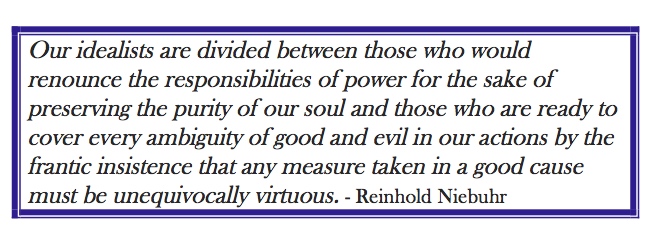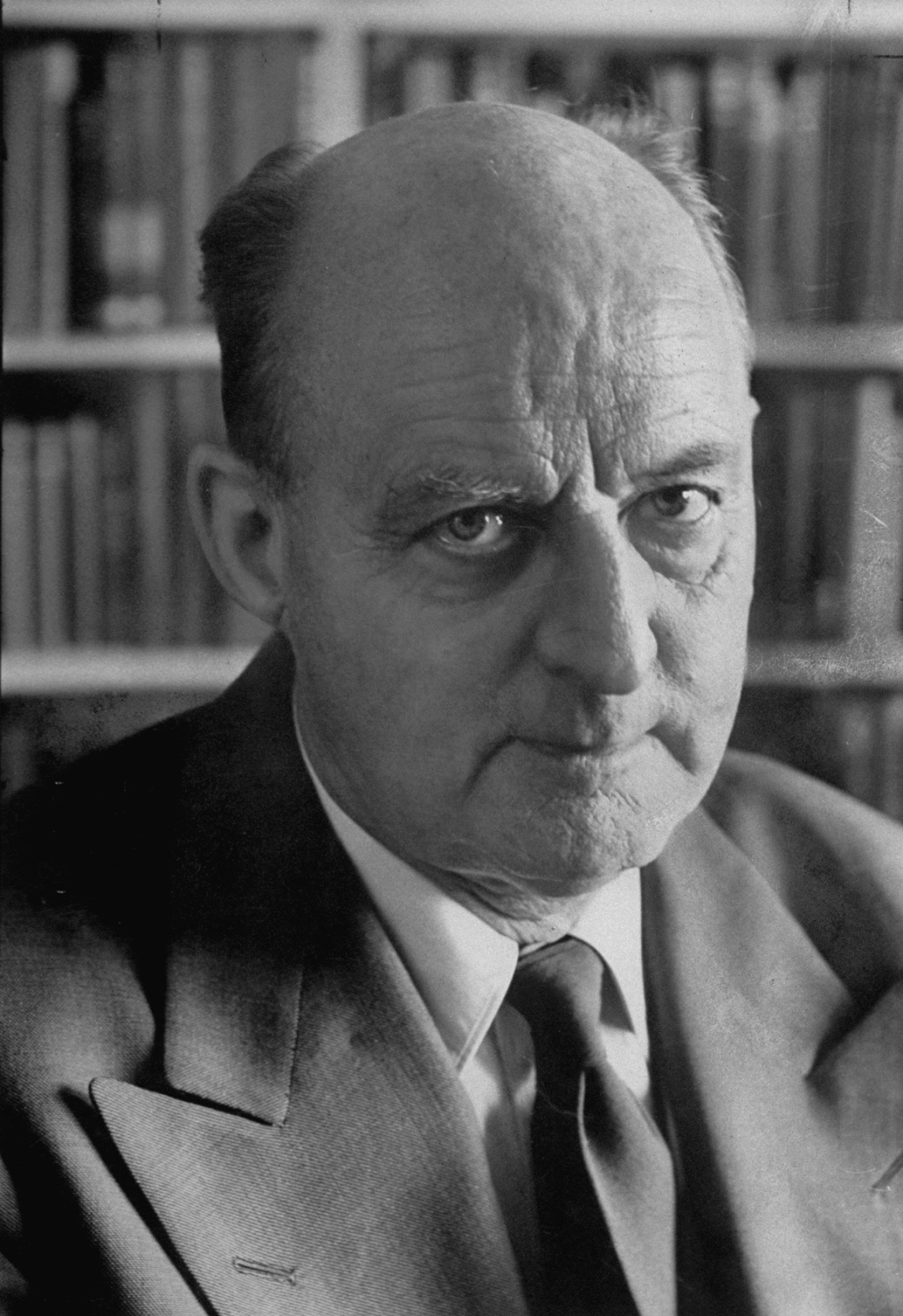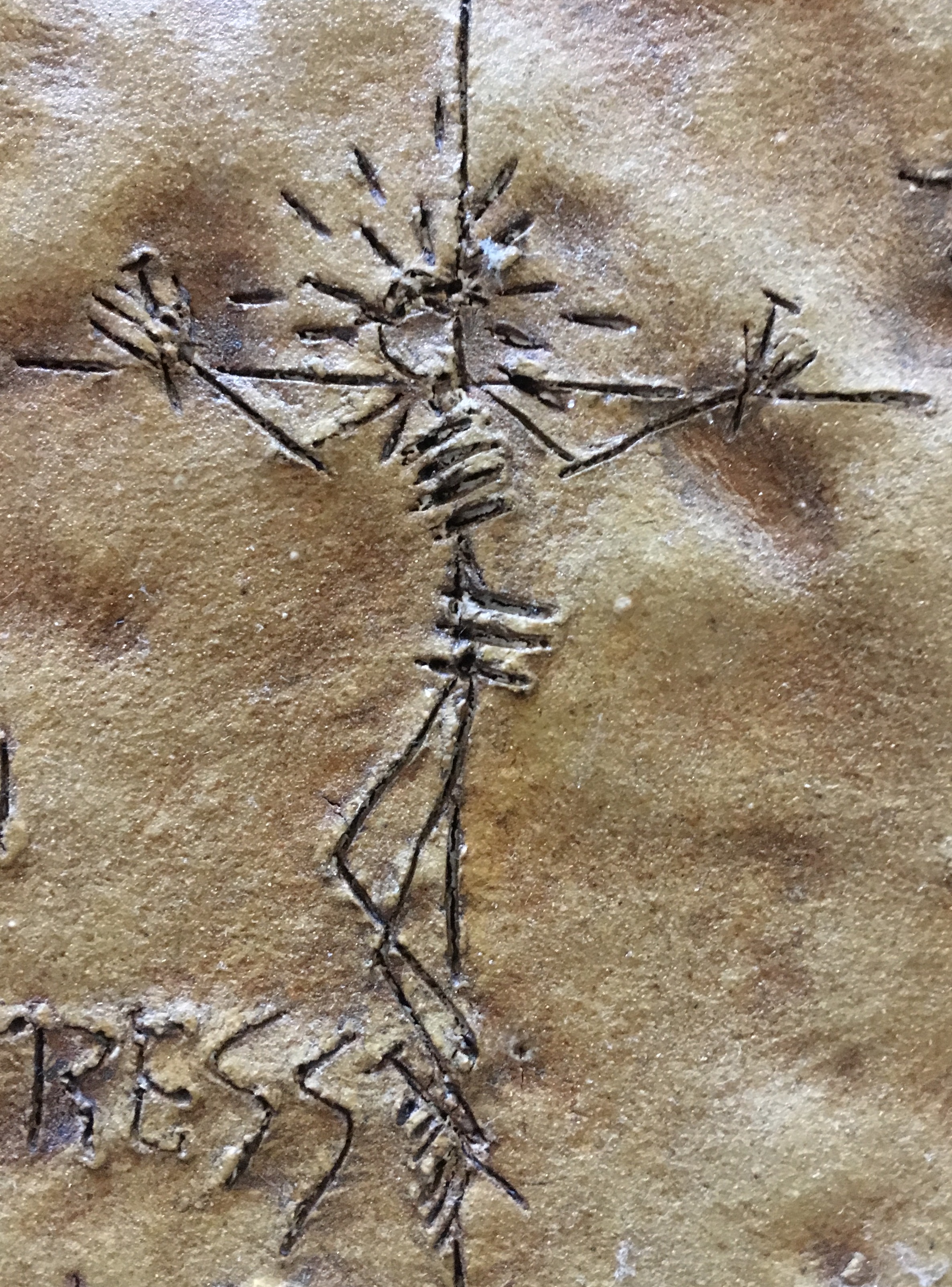He sets his body between us and the danger
 Sunday, May 7, 2017 at 6:55PM
Sunday, May 7, 2017 at 6:55PM  The preacher offered an image: “Someone comes into the church to do violence with a gun. There is nothing to stop him. The 'gate' between him and us is the baptismal font. That’s our gate.”
The preacher offered an image: “Someone comes into the church to do violence with a gun. There is nothing to stop him. The 'gate' between him and us is the baptismal font. That’s our gate.”
Here’s the reflection that went off in my head.
Of course, the preacher's correct. Our lives are in the hands of God. The waters of eternity are our protection. The waters have great power and there is a violence attached -- the flood, the Red Sea, death and resurrection.
My mind went off into its own sermon. I was seeking the complexity of the situation; the paradox we live within.
I guess the other element I needed to hear, and believe others needed to hear, was an acknowledgement of the ways in which people, at risk to themselves, place themselves at the gate. And that their action is also Gospel.
So, I found it upsetting to hear. One reason for my distress was real but not very immediate. I had been reading Reinhold Niebuhr. For a fourth or maybe it was the fifth time. I’m a citizen of a nation at war. There are people who have placed their bodies between people with guns and bombs and the rest of us.
The second reason for my being troubled was that I knew the story of one of the people serving as a greeter that day. She was at “the gate” for this mass. She was between the preacher’s “man with a gun” and the rest of us.
On another Sunday, some months ago, she had been the greeter. She saw a man wandering around looking the church over. Looking down the pathway to the parish hall. Looking into the narthex. It felt a bit “off” to her. She approached the man and asked if she could be of assistance. This man was from Homeland Security. He was going to make a presentation during coffee hour. All was well.
Later, during his talk, he made a point of affirming what the greeter had done. He noted how she had been very polite. But he also said that he had the sense that she would have taken stronger action if the situation called for it. He went on to say that as he walked around the outside of the building he was stopped in the same manner by two others from the parish.
“The gate” was flesh and blood. People who, if this man had been the preacher’s “man with a gun” had placed their bodies between him and the rest of us.
That’s the kind of situation Jesus was talking about. A shepherd who might end up laying down his life for the sheep. This is a situation where the sheep pen is probably a circle of rocks made into a rough wall. There’s an opening through which the sheep enter and exit. At night “the gate” is the shepherd lying across the opening. They are safe from wandering. The shepherd will act to stop the wolf or the thieves. He will use his staff and his knife to protect the sheep. He will engage in violence if need be. The shepherd places himself between the sheep and what would harm the sheep.
That’s what Jesus does for us.
He puts himself between us and the danger. He lays down his life for the sheep, for his friends, for us.
In the Liturgy for Good Friday that last collect includes this –
we pray you to set
your passion, cross, and death between your judgment and
our souls, now and in the hour of our death.
In the end, Jesus is pretty non-violent about it. He offers up his life.
We miss the point if we turn Our Lord’s act as being about non-violence in all situations. We confuse what is happening if we twist things to make a political point about guns or war or violence.
Jesus was more complex than that. He drives out the money changers in a fairly violent action - a whip, scattering their coins, overturning tables, driving them out of the Temple. (Mark 11: 15 – 17; Matt 21: 12 - 13, Luke 19: 45 – 46; John 2: 13 – 16). Then there’s the whole thing about the sword. It’s true that after the servant’s ear is cut off Jesus heals the man and tells Peter to put the sword away. Jesus has decided he must “drink the cup.”
But there’s also this – “Do not think that I have come to bring peace to the earth; I have not come to bring peace, but a sword.” (Matthew 10:34); and this: “He said to them, ‘But now, the one who has a purse must take it, and likewise a bag. And the one who has no sword must sell his cloak and buy one. For I tell you, this scripture must be fulfilled in me: 'And he was counted among the lawless;' and indeed what is written about me is being fulfilled.’ They said, ‘Lord, look, here are two swords.’ He replied, ‘It is enough.’ ” (Luke 22:36-38).
 There does seem to be some complexity here.
There does seem to be some complexity here.
It may help to read Moral Man and Immoral Society. A 2007 article by Paul Elie in The Atlantic described the book as, “a quick, deep thrust against the liberal accommodation with evil through naïveté, inaction, and confidence in 'reform' rather than the use of force. It’s a devastating critique of the yearning for purity and the radical forms that this yearning takes.”
 Reinhold Niebuhr
Reinhold Niebuhr
Most weeks I read something on the Religion & Politics web site. Yesterday I read “Reinhold Niebuhr, Washington’s Favorite Theologian,” by Gene Zubovich
The writer begins by observing how Niebuhr was an important theologian for Presidents Obama and Carter and how John McCain dedicates a chapter in one of his books to Niebuhr.
Reinhold Niebuhr is most active in the period when the world was dealing with the two totalitarianisms: fascism and communism. His task was to develop a theological stance that undergirded the West’s willingness and ability to engage half a century of struggle. He accepted the need to at times resort to violence in the protection of democracy.
The posting includes a quote by biographer Richard Fox about Niebuhr’s role in regard to those who had to exercise power and their need to “maintain faith in themselves as political actors in a troubled—what he termed a sinful—world. Stakes were high, enemies were wily, responsibility meant taking risks. Niebuhr taught that moral men had to play hardball.”
In 1940, the Second World War was underway, but America wasn’t fighting yet. Niebuhr argued with the pacifists, the uncertain church folk, and the America Firsters over what was responsible action in the situation. He had strong words. “If modern churches were to symbolize their true faith, they would take the crucifix from their altars and substitute the three little monkeys who counsel men to ‘speak no evil, hear no evil, see no evil’.”
Zubovich summarizes Niebuhr’s stance like this – “Sin, irony, tragedy. These words leapt out of the pages of Niebuhr’s books and speeches. Humanity was fallen and redeemed through God’s grace, Niebuhr wrote. But that redemption is always incomplete and we can never rise to the standards set forth in the Bible. Only by accepting our limitations could we make the best out of an imperfect situation. In a world full of evil, we must choose good, but we must accept that we can never get rid of sin entirely. The irony of our situation is that we must often do what is considered evil for the sake of good.”
Is that what Jesus did in the Temple?
It’s not just soldiers and police officers who place themselves at the gate. It can be political leaders and theologians. It can be the greeter at mass. It can be any of us.
 Bonhoeffer
Bonhoeffer
I have a handmade circular ceramic plaque on my wall. It’s just above my desk. At its center is a stick figure crucifix. Around the crucifix is a quote from Dietrich Bonhoeffer. The artist lifted phrases from a longer section, “After Ten Years: A Reckoning Made at New Year 1943,” in God is in the Manger: Reflections on Advent and Christmas
The quote helps me understand how he might have come to terms with his participation in the assassination plot. It also speaks to me more generally about what is involved in being a responsible person in a fallen world.
I believe that God can and will bring good out of evil
I believe that God will give us all the strength we need to help us to resist in all the times of distress.
I believe that even our mistakes and shortcomings are turned to good account.
I believe that God is no timeless fate, but that He waits for and answers sincere prayers and responsible actions.
Niebuhr and Bonhoeffer weren't saying exactly the same thing. What they did have in common was a sense that in the face of sin and human limitation, including our own, people are called to responsible action. And that God has mercy when our responsible action involves us in evil.
I believe that the parish church has two primary functions in carry out the mission of Holy Unity.
The first is to worship; to glorify God.
The second is to form the People of God for responsible lives in the world.
Maybe in every age it’s true, but most certainly in this age it’s true – the formation we offer in our parishes must include moral and ethical formation. And that work needs to be grounded in common prayer, a pattern of reflection, and the ability to accept the complexity of the choices before us.
rag+
Resources
Some quotes from Niebuhr
“A Man for All Reasons” in the Atlantic, 2007
Obama’s decision to not strike Syria when it used chemical weapons on its citizens -- “Which Niebuhr, President Obama?” Diana Butler Bass writes of the two Niebuhr bothers differing approach’s regarding President
She seems to tilt toward H. Richard who in the lead up to WW II spoke for caution. In these matters, I believe that Reinhold sees more clearly. If in their time, we had intervened earlier might the fascists have stepped back. And in our time, is President Obama had acted back then might we Obviously, there’s no way to know the answer to those questions. And yet, those responsible for national security must decide.